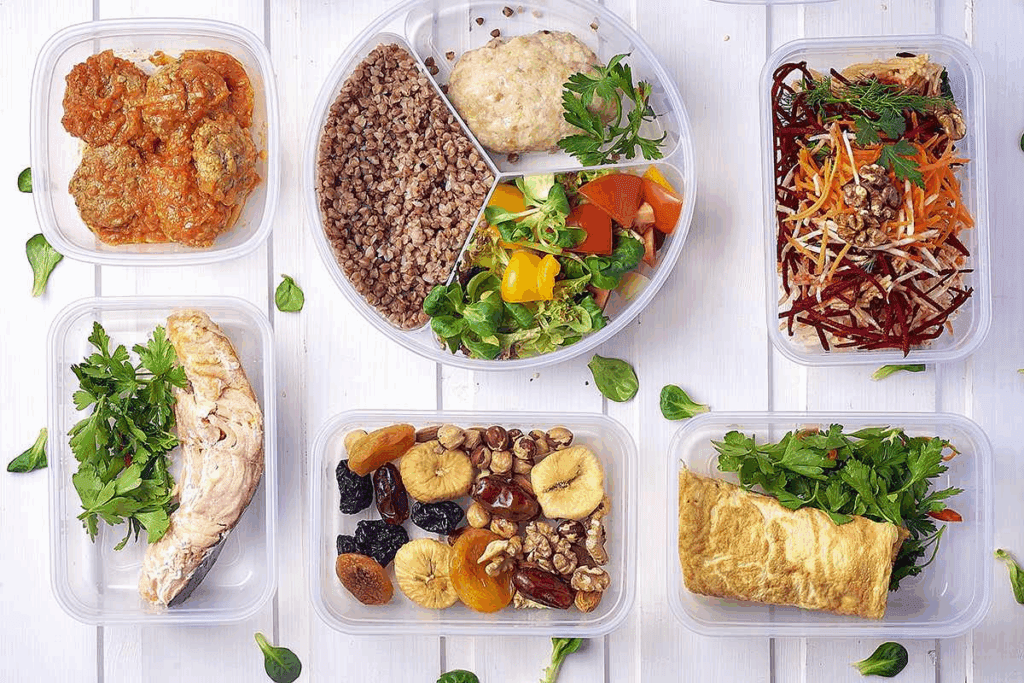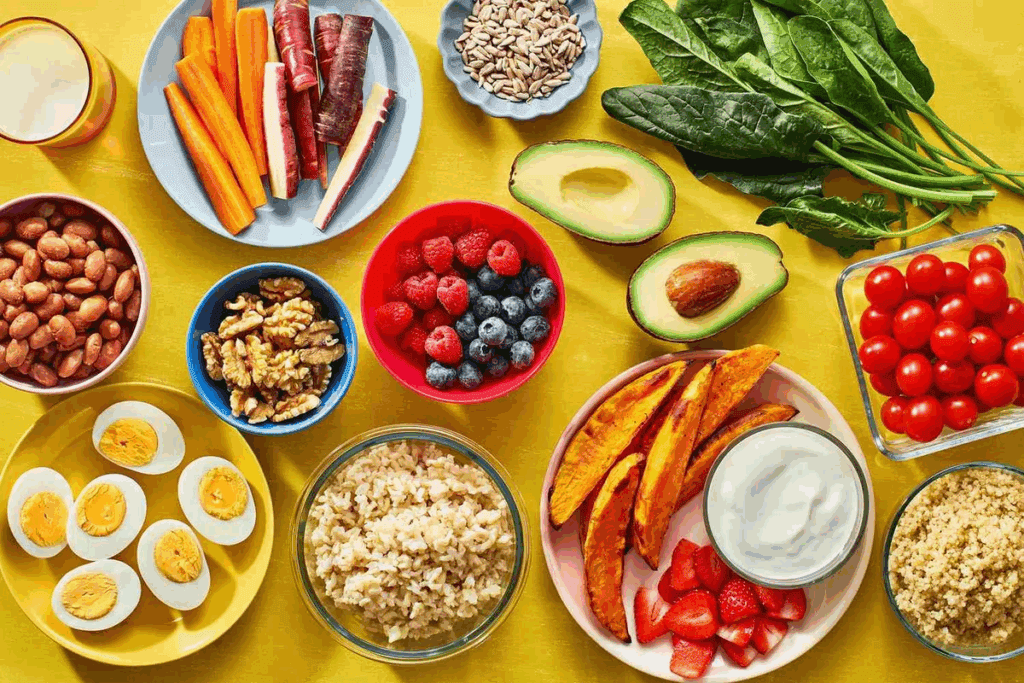
Five weeks after gastric sleeve surgery, patients start eating soft and solid foods. They focus on lean proteins and nutrient-rich foods in small meals.Master your diet after sleeve surgery with our 5-week essential eating plan. Learn what you can eat and how to eat safely post-op.
Liv Hospital guides patients with the latest advice and care. This helps them safely move to new meals. It’s key to eat nutrient-rich foods and avoid fatty meats, tough veggies, and sweets.
Following a good post-operative diet plan helps with weight loss. Patients learn to eat smaller portions. Aim for 60-75 grams of protein and 900-1,000 calories daily.
Key Takeaways
- Eat small, frequent meals to manage nutritional needs.
- Prioritize lean protein sources and nutrient-dense foods.
- Avoid high-fat meats, fibrous vegetables, and sugary foods.
- Stay hydrated with at least 48-64 ounces of fluid daily.
- Target 60-75 grams of protein and 900-1,000 calories per day.
Your Nutritional Needs at 5 Weeks Post-Surgery

At the five-week mark after surgery, knowing what you need to eat is key. Your body is healing, and your digestive system is getting used to the changes from the surgery.
Physical Changes in Your Digestive System
By five weeks, your stomach is healing but is smaller. Your diet is divided into stages to help with this healing. “Following your doctor’s diet plan is essential for a good recovery,” experts say.
Nutritional Goals at This Stage
Your main goal is to help your body repair and stay healthy. You need about 60-75 grams of protein each day. Focus on lean protein sources and nutrient-dense options to get enough.
Your meals should include a variety of foods. Tender vegetables and soft fruits are great. They give you important vitamins and minerals without hurting your stomach.
The Importance of Following Dietary Guidelines
It’s very important to stick to your diet to avoid problems. A good diet plan helps you deal with the challenges of eating after surgery. “A diet plan made just for you is key for a smooth recovery,” doctors say.
Eat foods that are lean, tender, and soft. Avoid foods high in fat, sugar, and fiber. This diet supports your health and helps you lose weight.
Transitioning to Soft and Solid Foods

Starting to eat soft and solid foods is a big step after gastric sleeve surgery. This usually happens around 5 weeks after surgery. It’s a key part of getting back to normal eating and staying healthy.
Signs You’re Ready for More Textured Foods
Before you start eating softer foods, make sure you’re ready. Look for these signs:
- Tolerance to previous foods without discomfort
- Minimal to no nausea or vomiting
- Ability to consume adequate protein and fluids
A healthcare expert says, “Moving to more textured foods should be based on how you feel, not just the time after surgery.”
“The key to a successful post-gastric sleeve diet is gradual progression and listening to your body’s responses.”
How to Introduce New Foods Safely
When adding new foods, do it slowly to avoid any issues. Start with one new food at a time, in small amounts. Make sure to chew your food well and eat slowly to help with digestion and avoid discomfort.
Here’s a sample plan for introducing new foods:
| Food Type | Examples | Tips for Introduction |
| Soft Foods | Mashed vegetables, soft fruits, lean meats | Start with small portions, chew thoroughly |
| Solid Foods | Lean proteins, cooked vegetables, soft grains | Gradually increase portion sizes, monitor tolerance |
Recommended Progression Timeline
The time it takes to start eating soft and solid foods varies. Usually, it’s around 4-6 weeks after surgery. Be patient and don’t rush, as your stomach is healing and adjusting.
By following these tips and listening to your body, you can smoothly move to a more varied and healthy diet. This supports your health and well-being after gastric sleeve surgery.
Diet After Sleeve Gastrectomy: The 5-Week Milestone
Five weeks after sleeve gastrectomy, patients start a new diet phase. It’s key to balance nutrition and healing. Knowing what to eat is vital for recovery.
“A well-planned diet is the cornerstone of a successful recovery after sleeve gastrectomy,” says experts. A structured eating plan is essential. Daily protein is a big part of this.
Daily Protein Requirements
Patients need 60-75 grams of protein daily. This helps keep muscles strong and healthy. Lean proteins like poultry, fish, and eggs are good choices.
For example, a protein shake for breakfast, grilled chicken for lunch, and baked fish for dinner. This way, patients meet their protein needs.
Calorie Targets
Calories are also important. Patients usually aim for 900-1000 calories a day. This helps with weight loss and keeps the body energized.
Choosing foods high in nutrients is key. Focus on vitamins, minerals, and other essential nutrients.
Balanced Nutrition Planning
Planning a balanced diet means eating a variety of foods. Include lean proteins, tender veggies, soft fruits, and whole grains. Avoid foods high in calories, fat, and sugar.
A balanced diet helps with recovery and long-term success. As one patient said, “Sticking to the recommended diet has been a game-changer for my weight loss journey.”
By focusing on protein, calories, and balanced nutrition, patients can overcome the 5-week milestone. They can keep moving towards a healthier lifestyle.
Portion Control and Eating Techniques
Mastering portion control and healthy eating habits is key after gastric sleeve surgery. It’s about knowing the right portion sizes, how often to eat, and mindful eating. These steps help you smoothly transition to your new diet.
Appropriate Portion Sizes
After gastric sleeve surgery, your stomach is much smaller. So, portion control is very important. Aim for 1/4 to 1/2 cup per meal to avoid overeating and keep your stomach comfortable.
Here’s a table to help you understand food portions after surgery:
| Food Item | Recommended Portion Size |
| Protein Sources (e.g., chicken, fish) | 3 oz or the size of a deck of cards |
| Vegetables | 1/2 cup cooked |
| Fruits | 1/2 cup sliced or 1 small fruit |
Eating Frequency and Timing
Eating small, frequent meals helps manage hunger and prevents overeating. Aim for 3-6 small meals a day. This keeps your energy stable and supports your nutritional needs.
“Eating smaller meals more frequently can help control hunger and support a feeling of fullness, making it easier to stick to your dietary plan post-gastric sleeve surgery.”
Spreading out your meals also helps your stomach digest food better. This reduces the chance of discomfort or complications.
Mindful Eating Strategies
Mindful eating is essential after gastric sleeve surgery. It means eating slowly, chewing food well, and stopping when satisfied (not full). These habits help manage portions and improve your eating experience.
Here are some mindful eating tips:
- Eat in a distraction-free environment.
- Use smaller plates to help control portion sizes.
- Take small bites and chew slowly.
- Stop eating when you feel satisfied, not when you feel full.
By using these mindful eating strategies and focusing on portion control, you can better navigate your post-gastric sleeve diet. This supports your health and weight loss goals.
Recommended Foods for Your 5-Week Post-Op Diet
At the five-week mark after gastric sleeve surgery, you can start eating a wider variety of foods. It’s important to choose foods that are easy on your stomach and full of nutrients. These foods help with healing and keeping you healthy.
Lean Protein Sources
Lean protein is key for recovery and keeping your muscles strong. Here are some good sources:
- Poultry: Chicken and turkey are great, just make sure they’re cooked without the skin.
- Fish: Choose low-mercury fish like salmon and cod.
- Eggs: Eggs are packed with protein and are easy to add to your meals.
- Low-fat Dairy: Greek yogurt and cottage cheese are good choices.
Tender Vegetables and Soft Fruits
Tender veggies and soft fruits are full of vitamins, minerals, and fiber. Here are some examples:
- Soft Fruits: Bananas, avocados, and cooked apples are all good options.
- Tender Vegetables: Try cooked carrots, green beans, and spinach.
Healthy Carbohydrate Options
Whole grains and soft, cooked veggies are good carbs. Consider these:
- Whole Grains: Brown rice, quinoa, and whole-wheat bread are all good choices.
- Soft, Cooked Vegetables: Mashed sweet potatoes and cooked squash are also great.
Start adding these foods slowly and in small amounts. Make sure they agree with you. Stay away from foods high in fat, sugar, and fiber. They can upset your stomach or cause problems.
Foods to Avoid After Gastric Sleeve Surgery
Knowing which foods to avoid is key to a successful post-sleeve gastrectomy diet. After gastric sleeve surgery, some foods can cause discomfort or problems. It’s important to be careful with what you eat.
High-Fat and Processed Foods
High-fat and processed foods are hard on the stomach after gastric sleeve surgery. They can be tough to digest and may make you feel sick. Try to stay away from fatty meats, processed snacks, and fried foods.
Instead, choose lean proteins and whole, nutritious foods. They are better for your body.
Fibrous and Tough Textured Foods
Foods that are fibrous or tough can be hard to chew and swallow. They might cause blockages or discomfort. It’s best to limit or avoid foods like tough meats, raw veggies, and fruits that are high in fiber.
Cooking veggies until they’re soft can help with digestion. This makes them easier to eat.
Sugary Foods and Beverages
Sugary foods and drinks can cause dumping syndrome. This is when food moves too fast through your stomach, leading to nausea, dizziness, and diarrhea. It’s important to avoid sugary snacks, desserts, and sweet drinks.
Stick to natural sweeteners like fruits. Always check labels for added sugars. This helps keep your recovery smooth and your health on track.
By avoiding these foods, you can improve your recovery and health after gastric sleeve surgery. Always talk to a healthcare provider or nutritionist for specific dietary advice.
Hydration and Supplement Guidelines
After gastric sleeve surgery, staying hydrated and taking the right supplements are key. Drinking enough water helps prevent dehydration and keeps your body working right.
Daily Fluid Requirements
Doctors tell patients to drink 48-64 ounces of fluid every day. This is important for staying hydrated and keeping healthy during recovery.
Daily Fluid Intake Guidelines:
| Fluid Type | Recommended Daily Intake |
| Water | At least 48 ounces |
| Other fluids (e.g., clear broths, electrolyte-rich beverages) | Up to 16 ounces |
Best Hydration Practices
To keep hydrated, drink fluids all day long. Don’t drink during meals and wait 30 minutes after eating. This helps avoid discomfort and aids digestion.
Essential Vitamin and Mineral Supplements
After gastric sleeve surgery, your body needs more supplements because of the smaller stomach. Important supplements include:
- Multivitamins
- Calcium
- Vitamin D
- Vitamin B12
These supplements are vital for your health and prevent nutritional deficiencies. Always talk to your doctor about the right supplements for you.
Managing Individual Food Tolerance and Digestive Issues
Recovering from gastric sleeve surgery means learning to handle your food tolerance and digestive health. As you follow your post gastric sleeve diet, it’s key to see how foods affect you.
Tracking Your Food Responses
Tracking your food responses is vital for a good diet. A food diary helps you spot foods that upset your stomach or cause discomfort. This way, you can choose wisely for your sleeve gastrectomy diet after surgery.
- Record the foods you eat and any symptoms you experience.
- Note the portion sizes and eating techniques used.
- Adjust your diet based on your observations to improve digestive comfort.
Common Digestive Challenges
After gastric sleeve surgery, many face digestive problems. These include:
- Constipation: Caused by not drinking enough or eating too little fiber.
- Diarrhea: Often from eating too much sugar or fat.
- Dumping syndrome: Happens when food, like sugar, moves too fast from the stomach to the small intestine.
Knowing these challenges is the first step to managing them.
When to Consult Your Healthcare Provider
If you have ongoing or severe digestive problems, see your healthcare provider. They can help adjust your diet after sleeve gastrectomy and suggest supplements if needed.
Remember, how well you tolerate food can change a lot after gastric sleeve surgery. Paying attention to how your body reacts and getting advice when needed helps you recover better.
Slowly adding new foods and watching how your body reacts is a smart way to manage digestive comfort. With the right guidance, you can have a successful recovery and enjoy long-term health benefits from your gastric sleeve surgery.
Conclusion: Long-Term Success with Your Gastric Sleeve Diet
Success with a gastric sleeve diet means living a healthy lifestyle. It’s important to stick to a diet that’s good for you. This includes eating lean proteins, foods full of nutrients, and drinking enough water.
It’s also key to eat at regular times and take vitamins and minerals. A good diet after surgery helps keep you healthy. It makes sure you get all the nutrients you need.
Choosing the right foods and following a diet plan can lead to lasting weight loss. It’s also important to see your doctor regularly. This helps you stay on track with your weight loss goals.
FAQ
What can I eat 5 weeks after gastric sleeve surgery?
At 5 weeks post-op, you can eat soft and solid foods. This includes lean proteins like poultry, fish, eggs, and low-fat dairy. Also, tender veggies and soft fruits are okay.
How much protein should I consume daily after gastric sleeve surgery?
You should aim for 60-75 grams of protein daily. This helps with tissue repair and overall health.
What are the calorie targets for a 5-week post-gastric sleeve diet?
Most patients aim for 900-1000 calories daily.
How often should I eat after gastric sleeve surgery?
Eat 3-6 small meals a day. This helps manage nutritional needs without overloading your stomach.
What are the appropriate portion sizes after gastric sleeve surgery?
Eat about 1/4 to 1/2 cup per meal. This prevents overeating and stomach stretching.
What foods should I avoid after gastric sleeve surgery?
Avoid high-fat and processed foods. Also, fibrous and tough foods, and sugary items. These can cause discomfort and complications.
How much fluid should I drink daily after gastric sleeve surgery?
Drink at least 48-64 ounces of fluid daily. This helps prevent dehydration.
What supplements are essential after gastric sleeve surgery?
Take multivitamins, calcium, vitamin D, and vitamin B12. These supplements help prevent deficiencies.
How can I manage digestive issues after gastric sleeve surgery?
Track your food responses and adjust your diet as needed. Also, use supplements if necessary to manage digestive challenges.
When should I consult my healthcare provider about digestive issues?
If you have persistent or severe digestive issues, talk to your healthcare provider. They can offer guidance.
References
Sherf Dagan, S., Goldenshluger, A., Globus, I., Schweiger, C., Kessler, Y., Kowen Sandbank, G., Ben-Porat, T., & Sinai, T. (2017). Nutritional recommendations for adult bariatric surgery patients: clinical practice. Advances in Nutrition, 8(2), 382–394. https://www.ncbi.nlm.nih.gov/pmc/articles/PMC5347108/







